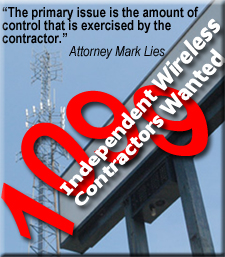|
IRS independent contractor reversal and fines could topple Southwestern erector's business
July 12, 2006 - A small and relatively successful Southwestern tower erection and maintenance company is staving off bankruptcy after the Internal Revenue  Service disallowed the independent contractor status of some of its subcontracted labor and assessed the company $36,700 in back taxes and penalties last May after investigating a nine month period during 2005. Service disallowed the independent contractor status of some of its subcontracted labor and assessed the company $36,700 in back taxes and penalties last May after investigating a nine month period during 2005.
"I wasn't trying to take advantage of the subs that I used. In fact, they averaged $38.00 (per hour) or even higher," explained the frustrated 42-year-old owner who requested that his and the company's name not be published.
The owner/foreman, whose business has been established for four years, said he was forced to subcontract workers at higher pay scales after he was unable to employ full time technicians to complete his company's contractual obligations for a UMTS buildout.
Commingling of crews flagged in audit
Although the erector said that his independent contractors provided their own vehicles, tools and paid their own expenses, the IRS took exception, stating that they did not meet the tests for independence - specifically identifying the company's commingling of its employees with the subcontracted technicians on certain projects.
Further enforcing the IRS's assessment was the project's requirement for the contractor to provide a supervisory employee to specify the means and methods for accomplishing the installations in order to be in compliance with the project specifications for the subcontracted antenna and line installation work.
The issue of independent contractors has been a dilemma for years since the high profile case where the IRS found that hired freelancers working side by side and doing the same jobs as hired employees of Microsoft Corp., but not receiving benefits, were not independent contractors but employees, even though they were receiving higher wages to offset the lack of benefits.
What is an independent contractor?
According to the IRS, an independent contract is a worker who creates products or performs a service for a fee, but is not considered an employee, and therefore the company does not pay Social Security or federal and states taxes on behalf of the employee (the employee has to make these payments his or her self).
 Additionally, employers do not pay unemployment insurance, workers compensation insurance, or retirement benefits on behalf of the employee. If the independent contractor earns more than $600 a year from a company, the independent contractor must receive a 1099-MISC, which reports the federal and state government wages paid. Additionally, an independent contractor is not an employee, and therefore he or she cannot sue an employer for a wrongful act or injury suffered on the job. Additionally, employers do not pay unemployment insurance, workers compensation insurance, or retirement benefits on behalf of the employee. If the independent contractor earns more than $600 a year from a company, the independent contractor must receive a 1099-MISC, which reports the federal and state government wages paid. Additionally, an independent contractor is not an employee, and therefore he or she cannot sue an employer for a wrongful act or injury suffered on the job.
The IRS frequently audits companies - especially construction contractors - who hire large numbers of independent contractors. If the independent contractor is found to be an employee, the company can be hit with enormous back taxes, fines, and interest payments. In addition, the employee can be entitled to equal treatment under the state labor laws, including benefits such as fair wage, hours, overtime pay and other reimbursements plus additional benefits other then those mandated by regulators.
Utilizing service providers who do not meet the legal criteria to be deemed an independent contractor can also create exposure for workers compensation premiums on the amounts paid to the service provider. Plus the company's compensation carrier can be forced to pay the claim of a service provider's injured worker.
According to some authorities, an individual, non-employee taxpayer who reports more than $10,000 earned income from a single source is of particular interest to the IRS.
In addition, whenever an individual classified as an independent contractor receives a majority of his/her income from a single source, the "independence" of that worker is called into question and the IRS may investigate the company issuing that 1099.
An IRS investigation of a firm's worker classifications can result from either a random audit of the firm or from a triggering event. For example, a worker applying for unemployment benefits or filing a Worker Compensation claim could challenge his or her classification.
Top 20 questions for independent contractor status
According to Mark A. Lies II, a labor and employment law attorney specializing in the tower erection and construction industry and partner with Seyfarth Shaw LLP, the twenty common law questions provided by the IRS that can assist companies in determining independent contractor status is also the template that is used by OSHA, EEOC and other agencies in deciding liability and enforcement concerns.
"The primary issue is the amount of control that is exercised by the contractor," Lies said, explaining that when companies hire a contractor it is imperative that the companies separate themselves and allow the contractor to serve as an independent contractor with minimal supervision.
 |
| The IRS has developed twenty common law factors which are used on a case by case basis to determine whether a worker is an independent contractor or an employee for IRS tax purposes. Independent contractors do not have to satisfy all of the twenty common law factors. It is best to think of the factors as weights on a balance scale. Please see: Common Law Questions. |
The more control the business has over a worker; the more likely it is that the worker is an employee rather than an independent contractor, he said.
Although some wireless contractors will hire technicians and provide them with a 1099-MISC form, many require the independent contractor to have an established business entity, with his or her own tax identification number.
Some companies push the independent contractor window by forming or subcontracting to crews that are compensated as independent contractors, but are under the daily control and direction of the company that employs them. If audited by the IRS, they might find attorneys reluctant or incapable of defending their position.
Other contractors believe that it is permissible to hire a master electrician or master welder as an independent contractor since those professionals perform a service that is outside the usual course of business for the employer such as tower technicians installing lines and antennas; and they're customarily engaged in an independently established trade.
A frequent but questionable practice of some businesses is to pay independent contractors by the hour based upon the company's project requirements.
Improper use undermines fair market competition
Most states have adopted the IRS 20 question guidelines, but some have their own rules for independent contractor assessment.
Massachusetts has one of the nation's most stringent guidelines. The state's legislature was concerned about employers improperly classifying their employees as independent contractors and passed an amendment to their Independent Contractor Law in 2004. They said that owners were depriving workers of proper Social Security contributions, workers compensation insurance and other benefits, while also unfairly reducing employers' state and federal tax withholding, and related obligations.
They also stated that the practice disadvantages those businesses that bear higher costs in complying with the law and independent contractor misclassification undermines fair market competition.
Massachusetts investigators can issue a civil citation or institute criminal prosecution for both intentional and unintentional violations of the Independent Contractor Law. Violations can carry a potential maximum penalty of up to $50,000 per civil violation, as well as prison time and criminal fines for criminal violations.
Use caution when soliciting independent contractors
Some wireless contractors either openly flaunt violations or are unaware of the requirements for hiring independent contractors. Bulletin board ads oftentimes solicit independent contractors to work with company crews on projects, further explaining that the position could evolve into full time employment as a member of that crew. Other firms requiring temporary help for a wireless construction contract will hire independent contractors to assist their staff for a project's duration that may be as short as five days or less - plainly in conflict with IRS guidelines.
Independent contractors can offer a valuable service in the industry in all aspects of wireless design, development, installation and maintenance. However, it's advisable for both the worker and the hiring officer to ensure that the worker is clearly an independent contractor. A complete agreement to that effect is useful and recommended; however, any agreement, no matter how well drafted and explained to each party and signed, will not change the results if a person is held to be an employee under the facts and circumstances.
The laws surrounding the employee versus independent contractor issues are extremely complex and you should consult with an employment or tax attorney about these concerns.
|
 July 13, 2006 July 13, 2006
Dear Wireless Estimator Editor:
Thank you for the article about the Southwest Tower Contractor and his troubles with the IRS.
I have absolutely NO sympathy for this operator. Like safety, the business side of the operation should be attended to. He skirted the law, he knew he did it and he got caught. This isn't a legitimate dispute of tax law interpretation.
The issue of passing off sub-contractors as employees is well settled law in the US. The IRS has been after these violations for years. The ONLY reason a company does this is to avoid paying taxes and other overhead on the employees. As well, the employees usually don't pay taxes themselves and operate in an underground economy.
If the owner took on a contract for which he did not have the staff or have a reasonable plan to acquire staff to meet contracted levels, then it is his fault for managing his business improperly. His excuse that he "…was forced to subcontract workers at higher pay scales..." is pretty lame. Anyone who has sympathy for this contractor is probably doing the very same things, i.e., using subs improperly.
It is unfair to other business owners when a contractor ignores their statutory obligations for the purpose of making an additional buck or to make life easy for themselves.
I suggest that the tower contractor go find the funds he should have paid; negotiate a payment arrangement with the IRS or get ready for years of the IRS chasing him.
/s/ Ken McLeod, President
CSG Wireless Incorporated
Gilbert, AZ
NATE Member
|
|